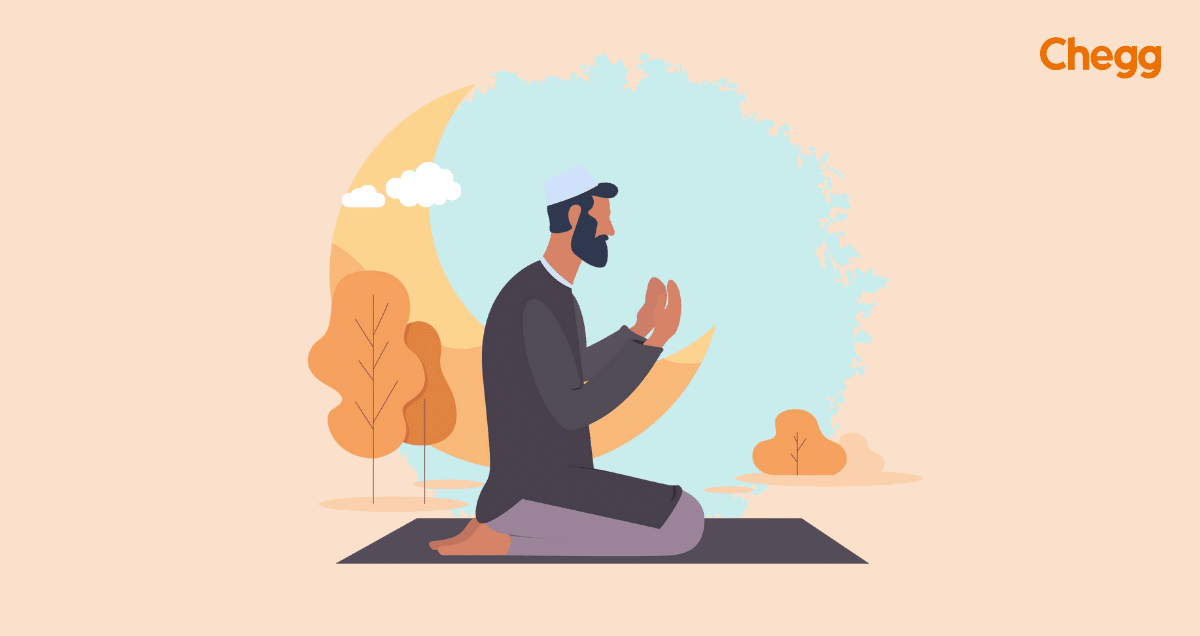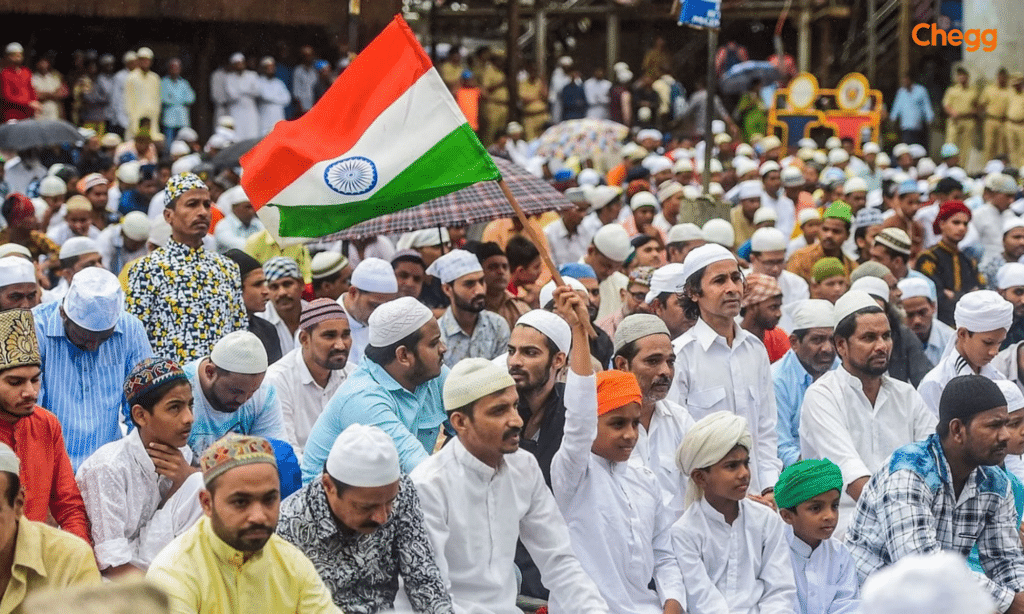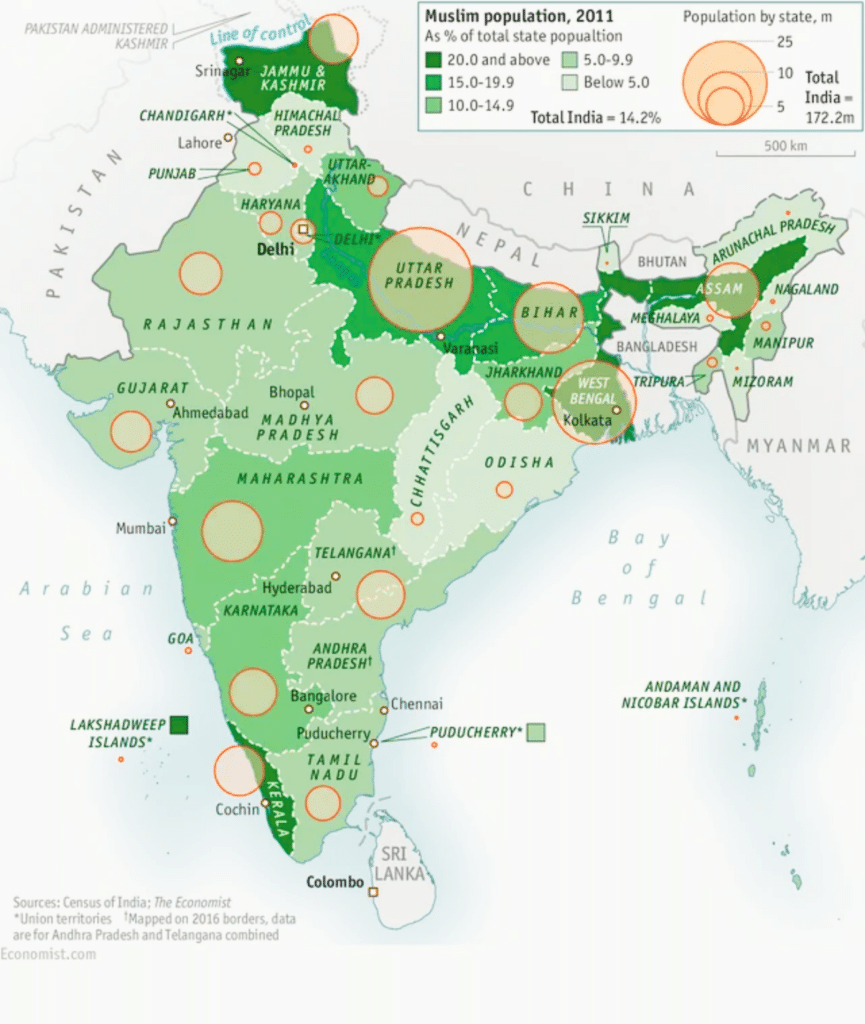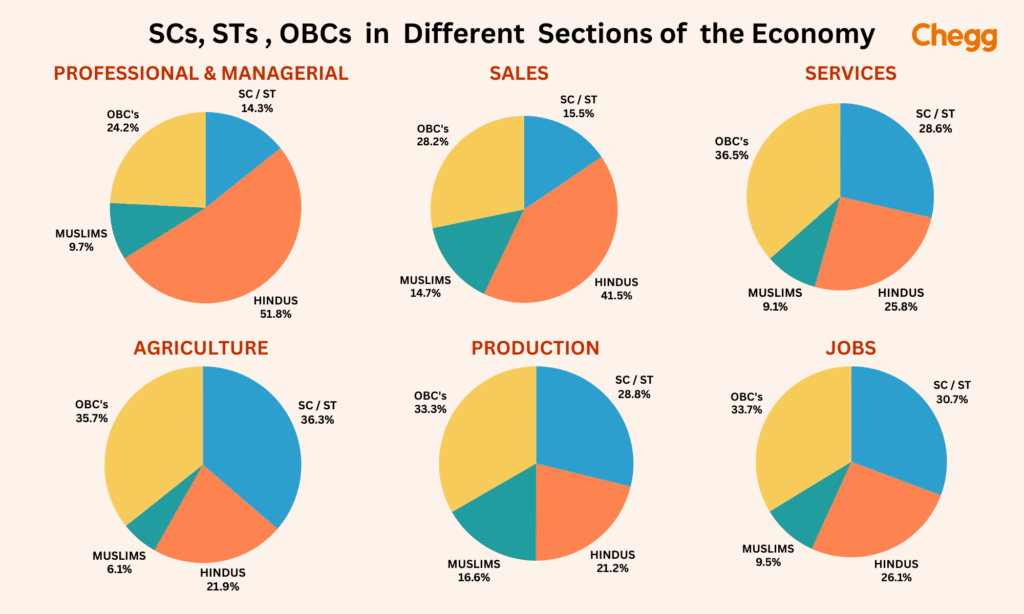
Table of Contents
The Muslim Other Backward Classes (OBC) caste list in India includes various communities that are recognized as socially and educationally disadvantaged. These communities are accorded OBC status by the Government of India and some state governments.OBC, or Other Backward Classes, refers to individuals from socially or educationally disadvantaged groups. Let’s take a look at the Muslim OBC caste list in India and explore the different groups included within this category!
Muslim Community
The Muslim caste in India makes for one of the largest minority communities in the country. The community follows several sects, traditions, and cultural practices. Reports state that India is home to around two hundred million Muslims. Hence, they constitute one of the world’s largest Muslim populations. However, they are still considered a minority in this predominantly Hindu country.
Most of the Muslim community identify as Sunni. This community makes up around 15% of the population. Whereas, the Hindus make up around 80% of the population. The Muslim communities in India are diverse. However, their differences are identified in terms of language, caste, and ethnicity. It also involves the access to political and economic power in the country.
The larger South Asian ethnic groups form a majority of Muslims in India. Some of the Muslims in the country were found with a gene flow from outside countries. So, they come from the Middle East as well as Central Asia. According to several sources, castes among Muslims developed because of the concept of Kafa’a. Those referred to as Ashrafs have a superior status derived from their foreign Arab ancestry. On the other hand, the Ajlafs converted from Hinduism have a lower status in society.

Muslim Reservation in India
Numerous communities are included in the Muslim reservation categories within both the Central OBC and various state OBC lists. Muslim OBCs constitute around 41% of the total population of people from this religion, according to a 2005 National Sample Survey Organisation survey.
The Muslims have a higher population in several South Indian states. Kerala has the fifth largest population of Muslims in the country. The state has OBC reservations for the entire Muslim community. It is around 8% in educational institutions and 10% in several government jobs. Moreover, Tamil Nadu provides reservations to around 95% of Muslim communities. Karnataka has 32% of reservations for the OBCs, out of which 4% get Muslim reservations. Many states like Bihar have also bifurcated OBCs into backward and most backward classes. Hence, most of the Muslim communities fall under the most backward category.

Muslim reservation in India is done to address socio-economic disparities. It also helps uplift socially and economically backward sections within the Muslim community. The reservation also enables the community to participate equitably in the development and progress of the country. Hence, the Muslim OBC caste list underscores India’s commitment to reducing disparities and promoting diversity across all religious groups.
Muslim OBC Caste List – State Wise
The Muslim caste list is released by the All India Muslim Personal Law Board, keeping in mind the caste census. The authorities often update the caste in the Muslim list depending on several factors. This list includes the names of Muslim castes under the OBC category.
Muslim OBC caste list across different Indian states
| Sr.No. | Name of the State | Entry no. in the central list | Name of the caste |
| 1 | Andhra Pradesh | 37 | Mehtar (Muslim) |
| 2 | Assam | 13 | Manipuri Muslim |
| 3 | Bihar | 130 | Bakho (Muslim) |
| 84 | Bhathiara (Muslim) | ||
| 38 | Chik (Muslim) | ||
| 42 | Churihar (Muslim) | ||
| 46 | Dafali (Muslim) | ||
| 57 | Dhobi (Muslim) | ||
| 58 | Dhunia (Muslim) | ||
| 119 | Idrisi or Darzi (Muslim) | ||
| 5 | Kasab (Kasai) (Muslim) | ||
| 91 | Madari(Muslim) | ||
| 92 | Mehtar } Lalgbegi } (Muslim)Halalkhor} Bhangi} | ||
| 93 | Miriasin (Muslim) | ||
| 102 | Mirshikar (Muslim) | ||
| 103 | Momin (Muslim) | ||
| 99 | Mukri (Mukcri) (Muslim) | ||
| 67 | Nalband (Muslim) | ||
| 63 | Nat (Muslim) | ||
| 68 | Pamaria (Muslim) | ||
| 109 | Rangrez (Muslim) | ||
| 111 | Rayeen or Kunjra (Muslim) | ||
| 116 | Sayees (Muslim) | ||
| 131 | Thakurai (Muslim) | ||
| 129 | Saikalgarf (Sikligar) (Muslim) | ||
| 4 | Chandigarh | NIL | |
| 5 | Dadra Nagar Haveli | 9 | Makarana(Muslim) |
| 6 | Daman & Diu | NIL | |
| 7 | Delhi | NIL | |
| 8 | Goa | NIL | |
| 9 | Gujarat | 3 | Bafan (Muslim) |
| 17 | Dafar (Hindu & Muslim) | ||
| 19 | Fakir, Faquir (Muslim) | ||
| 20 | Gadhai (Muslim) | ||
| 22 | Galiara (Muslim) | ||
| 23 | Ganchi (Muslim) | ||
| 24 | Hingora (Muslim) | ||
| 28 | Jat (Muslim) | ||
| 27 | Julaya, Garana, Taria, Tari and Ansari (All Muslim) | ||
| 32 | Khatki or Kasai Chamadia Khatki Halari Khatki (All Muslim) | ||
| 43 | Majothi Kumbhar Darbar or Badan Majothi (All Muslim) | ||
| 44 | Makrani (Muslim) | ||
| 45 | Matwa or Matwa-Kureshi (Muslim) | ||
| 40 | Mir Dhabi Langha Mirasi (All Muslim) | ||
| 49 | Miyana, Miana (Muslim) | ||
| 54 | Pinjara Ganchi-Pinjara Mansuri-Pinjara (All Muslim) | ||
| 59 | Sandhi (Muslim) | ||
| 65 | Sipai Pathi Jamat or Turk Jamat (All Muslim) | ||
| 70 | Theba (Muslim) | ||
| 73 | Hajam (Muslim), Khalipha (Muslim) | ||
| 76 | Vanzara (Muslim) | ||
| 76 | Wagher (Hindu & Muslim) | ||
| 10 | Haryana | NIL | |
| 11 | Himachal Pradesh | NIL | |
| 12 | J&K | NIL | |
| 13 | Karnataka | 13 | chapper Band (Muslim) |
| 179 | Other Muslim excluding: 1. Cutchi Menon 2. Navayat 3. Bohra or Bhora or Borah 4. Sayyid 5. Sheik 6. Pathan 7. MughalMahdivia/Mahdavi 8. Konkani or Jamayati Muslims | ||
| 14 | Kerala | 39A | Other Muslims excluding: 1. Bohra 2. Cutchi Menmon. 3. Navayat 4. Turukkan 5. Dakhani Muslim |
| 15 | Madhya Pradesh | 59 | Islamic Groups: 1. Ranrej 2. Bhishti Bhishti-Abbasi 3. Chippa/Chhipa 4. Hela 5. Bhatiyara 6. Dhobi 7. Mewati,Meo 8. Pinjara, Naddaf, Fakir/Faquir, Behna, Dhunia; Dhunkar, Mansoori 9. Kunjara,Raine 10. Manihar 11. Kasai,Kasab,Kassab, Quasab, Qassab, Qassab-Qureshi 12. Mirasi 13. Barhai (Carpenter) 14. Hajjam(Barber) Nai (Barber) Salmani. 15. Julaha-Momin Julaha-Ansari Momin-Ansari 16. Luhar, Saifi, Nagauri Luhar Multani Luhar 17. Tadavi 18. Banjara, Mukeri, Makrani 19. Mochi 20. TeliNayata, Pindari (Pindara) 21. Kalaigar 22. Pemdi 23. Nalband 24. Mirdha(Excluding Jat Muslims) 25. Nat (Other than those included in the SC List) 26. Niyargar, Niyargar-Multani Niyaria 27. Gaddi |
| 16 | Maharashtra | 187 | Chhapparband (including Muslim) |
| 17 | Manipur | NIL | |
| 18 | Orissa | NIL | |
| 19 | Puducherry | NIL | |
| 20 | Punjab | NIL | |
| 21 | Rajasthan | 23 | Julaha (Hindu &, Muslim) |
| 22 | Sikkim | NIL | |
| 23 | Tripura | NIL | |
| 24 | Tamil Nadu | 26 | Dekkani Muslim |
| 25 | Uttar Pradesh | 44 | Muslim Kayastha |
| 22 | Teli Malik (Muslim) | ||
| 26 | Uttrakhand | NIL | |
| 27 | West Bengal | NIL | |
| 28 | Andaman & Nicobar | NIL | |
| 29 | Mizoram | No OBC | |
| 30 | Nagaland | No OBC |
People from the OBC category within the Muslim community are eligible for two types of benefits.
- External Social Benefits
- Internal Social Benefits
External social benefits include government provisions exclusively available for the citizens, including specific reservation benefits. Such benefits may also extend to the economically weaker section of society, including OBCs.
The internal social benefit includes the support provided by the Muslim community to its respective members. These benefits apply to both the Shia and Sunni communities within the society.
Reason Behind the Reservation
Several reports have said that the Muslim community is lagging in several social, educational, and economic indicators. For instance, the Sachar Committee report of 2006 noted that the Muslim community is lagging behind Hindu-OBCs as a whole. The committee also recommended different affirmative action methods for this particular community. The Kerala government formed a committee in 2008 based on the same report. It is noted that Muslims in Kerala are behind other communities in the social, economic, and educational fields. The government also recommended reservations in jobs and educational institutions for Muslims.

Dalit Muslims have further claimed that they must get reservations under the Scheduled Caste category in India. However, the Central has opposed this particular plea. Moreover, a case is already pending before the Supreme Court regarding this matter. Currently, the Muslim caste is included in the OBC category. As a result, they have to compete with communities that are often more privileged than them.
The Need for Muslim Reservation in India Muslim society is also divided into hundreds of types of castes. So, a very large population can be included in OBC if those castes are included on the ground. Presently, a proportion of Muslims get reservations under the OBC category in India. For the unversed, this category of reservations is for “backward classes” instead of any caste or religious group. Hence, legal experts say that this reservation for the Muslim caste is justified. It helps ensure that education and employment opportunities are accessible to all the castes, including the Muslim community. It remains an important step in the ongoing efforts to promote social equality and inclusion.
Also Read:-
Constituent Assembly of India: An Overview
The Right Against Exploitation: Articles 23 and 24
Partition of Bengal (1905): History, Causes, and Facts
Frequently Asked Questions ( FAQ’s )
Many Indian states have reservations for the Muslim community, and most of them are listed under the OBC category.
Members of the Shia and Sunni communities form a part of the Muslim caste in India.
Islam is the second largest religion followed in India, with a Muslim population of two hundred million people.
The reservation policy for the Muslim caste varies from state to state in India.
Got a question on this topic?